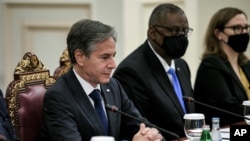U.S. Secretary of State Antony Blinken said Tuesday the Taliban had been reminded in recent hours that the international community is holding the group to its commitment to let anyone with valid travel papers leave Afghanistan if they choose.
Speaking during a visit to Qatar, Blinken said the number of U.S. citizens, including dual nationals, believed to still be in Afghanistan is about 100. He said the State Department is in direct contact with them, with case managers assigned to each one to make sure those who want to leave can do so.
He said in the past 24 hours the Taliban had upheld its commitment in the case of a family of four Americans who had safely left Afghanistan using an overland route. A senior State Department official said Monday the Taliban was aware of the crossing, without specifying which country the Americans entered.
Blinken also expressed “deep gratitude to the Qatari people” for the country’s role in the massive evacuation of U.S. citizens, at-risk Afghans and foreign nationals following the Taliban takeover in Afghanistan. He said that for many of the 58,000 people who transited through Doha, the stop in Qatar was the first “on a journey to a more peaceful and hopeful future.”
“What Qatar has done here for Americans, for Afghans, for citizens of many other countries, will be remembered for a long, long time,” Blinken said.
He spoke to reporters alongside U.S. Defense Secretary Lloyd Austin, Qatari Foreign Minister Mohammad bin Abdulrahman Al Thani and Defense Minister Khalid bin Mohammed al-Attiyah after a meeting to discuss the situation in Afghanistan along with other issues such as trade, counterterrorism and humanitarian aid.
Al Thani said teams from Qatar have been providing technical assistance in Kabul in order to try to get the airport there functioning for both humanitarian aid deliveries and commercial flights.
He said several challenges remain, including necessary equipment upgrades and meeting security standards before passengers can board international flights from Kabul.
“If we can get the security measures in place and agree on them with the Taliban, then things will be easier,” Al Thani said.
The Kabul airport was the scene of several chaotic days as the Taliban moved into the city and the U.S. military worked to secure the airport in order to facilitate evacuation flights. It was also the sight of an attack by Islamic State Khorasan militants that killed 13 U.S. service members and 169 Afghans.
Austin defended the effort and said what happened in the final days of the two-decade U.S. military presence in Afghanistan “will be studied in the days and months ahead.”
“I’m absolutely proud of the tremendous work that our brave servicemen and women did as we evacuated 125,000 people from the Kabul airport in a short amount of time,” Austin said. “No operation is ever perfect, there are lessons to be learned.”
With U.S. troops no longer in Afghanistan, Lloyd said there is “no questions that it will be more difficult to identify and engage threats that emanate from the region.” But he said the United States still has what he called “robust capabilities” and is committed to ensuring threats to the country do not develop.
“There isn’t a scrap of earth that we can’t reach out and touch when we need to. We’ve demonstrated that time and time again,” he said.
While in Doha on Tuesday, Austin and Blinken are also touring an in-processing center in Doha and visiting with U.S. military and diplomatic personnel.
Blinken is set to travel on to Germany to meet with U.S. troops and Afghan refugees at Ramstein U.S. Air Force Base.
He is also scheduled to lead a virtual 20-nation ministerial meeting on Afghanistan on Wednesday alongside German Foreign Minister Heiko Maas. Blinken said the 20 countries “all have a stake in helping to relocate and resettle Afghans and in holding the Taliban to their commitments.”
Austin’s tour of U.S. allies in the Middle East also includes stops in Bahrain, Kuwait and Saudi Arabia.






